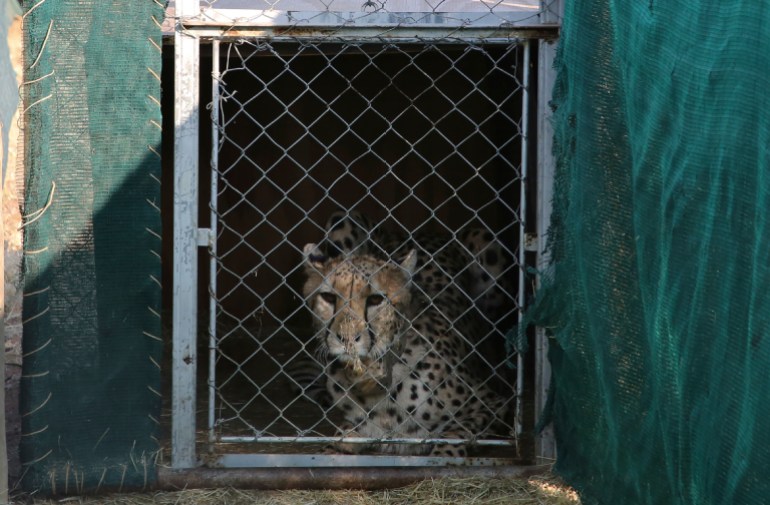Second African cheetah dies in India’s Kuno National Park
Uday was one of 12 cheetahs brought from South Africa in February as part of a government programme to reintroduce the big cats to India.

A second cheetah from Africa has died in India’s Kuno National Park in the central state of Madhya Pradesh.
The cause of Uday’s death remains unclear, and forest officials said an autopsy would be conducted.
Keep reading
list of 4 itemsIndia announces birth of cheetah cubs 70 years after extinction
India welcomes back cheetahs, 70 years after local extinction
Iran’s Asiatic cheetah cub, Pirouz, dies of kidney failure
Uday was one of 12 cheetahs brought from South Africa in February as part of a cheetah rehabilitation programme launched by the federal government.
“During a routine check at around 9am [03:30 GMT], Uday was found sitting in a lethargic state,” an official said on Sunday, according to local media reports. “When forest experts approached him, he got up and staggered a bit.”
Uday lost consciousness after two hours and was transferred to an isolation ward to receive medical care.
According to Principal Chief Forest Conservator JS Chauhan, Uday died during treatment about 4 pm (10:30 GMT) on Sunday.
African cheetahs in India
The Asiatic cheetah subspecies became extinct in India more than 70 years ago, but under the government programme, cheetahs were reintroduced to the South Asian country last year.
The first batch were eight Namibian cheetahs – five males and three females. But one of them, Sasha, died of a kidney ailment at the same park on March 27.

“I have no doubt cheetahs will survive. There is no issue,” Chauhan told local media.
“The cheetah that died earlier was sick before it was relocated here,” he said. “It had a kidney problem. But we want to know the cause behind the death of this second cheetah.”
He also said he had made a request to the national government to decide on another suitable habitat for the big cats.
“It is risky to keep all the cheetahs in one place,” he was quoted as saying.
Due to its grasslands and abundant prey, Kuno National Park was chosen as the ideal habitat for reintroducing the cheetahs.
The cats, the only large carnivore believed to have gone extinct in India, died out primarily from habitat loss and hunting for their distinctive spotted pelts.
Wildlife experts praised the reintroduction of cheetahs in India, but some warned the animals may face risks from other predators and a lack of adequate prey.